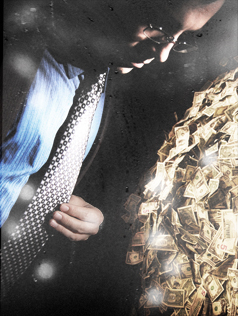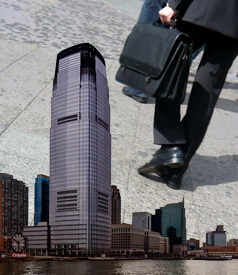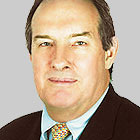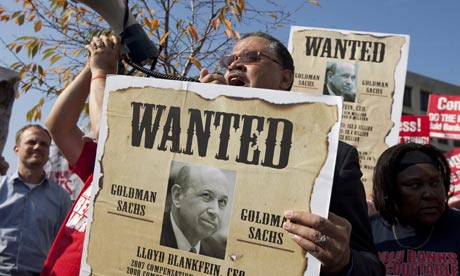Wednesday 21 April 2010
by: James Howard Kunstler, t r u t h o u t | Op-Ed
It's interesting and instructive to read The New York Times' lead story this morning, "Top Goldman Leaders Said to Have Overseen Mortgage Unit." While it pretends to report all the particulars of the huge scandal growing out of Friday's SEC action against Goldman Sachs (GS), the story really comes off as an attempt to create an alibi for the so-called "bank." It pretends that some kind of an intellectual struggle was going on among GS executives as to whether the housing market was doing just fine or poised to tank - therefore, muddling the company's intent in setting up investment deals based on sketchy mortgages designed to blow up, so that a favored big customer, John Paulson, could collect on the deal insurance known as credit default swaps.
The truth is that anyone with half a brain could see the securitized mortgage fiasco coming from 10,000 miles away. I said as much in Chapter Six ("Running on Fumes: the Hallucinated Economy") of my book "The Long Emergency," which was published in 2005, but written well before that in 2002-2004. And I had had no work experience whatsoever in banking generally or Wall Street investment banking in particular.
Ah! That's about the same time I took out a 4% fixed rate loan and paid off credit cards. Haven't used one since. It hasn't been easy, but I shutter to think where I would be if I had kept living above my means.
One week before the SEC action against GS, the Pro Publica web site published a story about virtually the same kind of mischief being run out of the Chicago-based hedge fund Magnetar led by a clever young fellow named Alec Litowitz. Like GS, Magnetar deliberately constructed investments (bundles of bundled mortgage-backed securities called collateralized debt obligations or CDOs) that were certain to fail, so that Magnetar could collect on credit default swaps that amounted to a bet against products they themselves had participated in creating. There was no question that Litowitz and his employees did this absolutely on purpose. Nor is there any question that they aggressively sold positions in these CDOs to credulous investors like Thrivent Financial for Lutherans and others.
The question that now begs to be answered is: why is this activity not being investigated and prosecuted under the federal Racketeer Influenced and Corrupt Organizations Act (RICO) statutes against racketeering? RICO was designed to punish exactly this kind of behavior, whether the defendant's name ended in a vowel or not. How is it not a racket to deliberately and systematically construct investments designed to fail so you can collect what amounts to insurance against them - and then to sell those financial instruments to customers without telling them that these investments were engineered to blow up? At the very least, it amounts to a failure to disclose material information, which is the basis for distinguishing illegality. More to the point, it almost certainly amounts to prosecutable criminal fraud and insider trading.
Dylan Ratigan at MSNBC asked pretty much this question on Friday when interviewing Connecticut Attorney General Richard Blumenthal (because the AIG company, headquartered in his state, sold gobs of credit default swaps to GS for dodgy CDOs, leading to a giant government bailout and incidental huge payoffs to GS). Blumenthal's answer was lame, to put it mildly - that recent federal rules tied his hands, he claimed. He could have at least publicly protested his hand tying and applied pressure to the US Department of Justice to enforce the anti-racketeering law.
So, where is the DOJ's criminal division in all this? The GS racket has been publicly known, in one form or another, for several years. I wrote in this space several times at least as far back as 2007 that GS was essentially shorting it's own issued securities, and I'm neither a lawyer nor a finance professional. Anyone could see this from just reading the news. Magnetar's activity was so notorious that the very business of engineering dodgy CDO investments to collect insurance on their failure became known throughout the industry as "the Magnetar Play."
The feigned cluelessness among some of the highest-profile figures in these rackets is something to behold. For instance, Citibank was among the companies that helped Magnetar put together their designed-to-fail CDOs. Citi's chairman at the time, former US Treasury Secretary Robert Rubin, testifying before the new Financial Crisis Inquiry Commission said, "Almost all of us, including me, who were involved in the financial system - that is to say financial firms, regulators, rating agencies, analysts and commentators - missed the powerful combination of factors that led to this crisis and the serious possibility of a massive crisis." Bank of America's CEO, Brian Moynihan, told a Congressional hearing, "No one involved in the housing system - lenders, rating agencies, investors, insurers, consumers, regulators, and policy-makers - foresaw a dramatic and rapid depreciation in home prices [and, therefore, in investment instruments based on mortgages]."
Either they are lying or they are profoundly stupid and incompetent. If the former, then they might be induced to spend some time talking to federal prosecutors; if the latter, then the US financial system is too hopeless to survive and we will all soon be bartering hand tools and designer shoes for food. Evidence of the latter is ample, for instance, in Citigroup's loss of 70 percent share value during Rubin's chairmanship - for which, in the crash year of 2008 alone, he was paid $17 million plus $33 million in stock options.
The GS SEC action and the related Magnetar story seems to be a pretty big deal, and appear to be dragging public opinion to a crossroads where we acknowledge the deep structural corruption of the financial system or watch the legitimacy of both banking and government dissolve. At least, it throws gouts of gasoline on the political fires lit by Tea Partiers and even more extreme political factions. I don't see how President Obama can keep Rubin at his elbow or the hosts of other GS alumni in their federal jobs. The whole episode is disgusting in the purest sense of the word. If Obama doesn't shake these people loose, and if he doesn't pick up the phone and direct his attorney general to execute the laws - including the RICO law - then all the moonbeams issuing from his renowned smile will not avail to keep him in office, or keep the financial underpinning of the USA from collapse.
This article has been previously published on James Howard Kunstler's blog.
James Howard Kunstler is the author of "The Long Emergency," the novel "World Made By Hand" and the sequel, "The Witch of Hebron," coming out in September from The Atlantic Monthly Press.
All republished content that appears on Truthout has been obtained by permission or license. Let The Sun Shine In......











